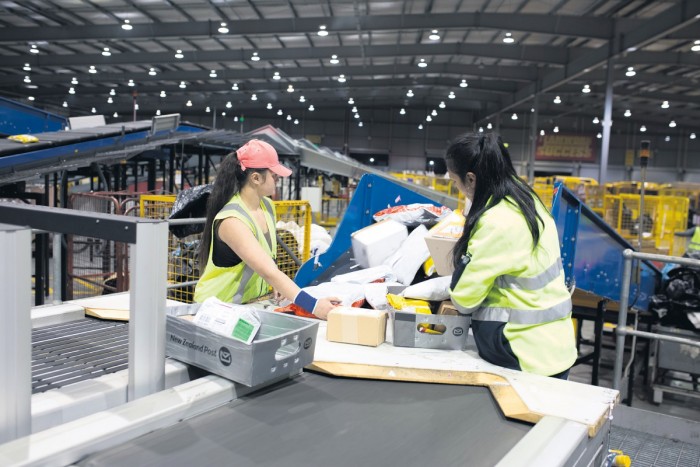Mail and Parcel Sorter
Kaimāhiti Reta/Pūhera
Alternative titles for this job
Mail and parcel sorters work in processing centres. They sort mail and parcels by address, either manually or by machine.
Pay
Mail and parcel sorters usually earn
$24 per hour
Source: New Zealand Post, 2018.
Job opportunities
Pay
Mail and parcel sorters usually earn minimum wage, plus a $3.50 an hour allowance if they work nights between 8pm and 6am.
Mail and parcel sorters in supervisory positions can earn more.
Source: New Zealand Post, 2018.
- PAYE.net.nz website – use this calculator to convert pay and salary information
- Employment New Zealand website - information about minimum wage rates
(This information is a guide only. Find out more about the sources of our pay information)
What you will do
Mail and parcel sorters may do some or all of the following:
- check mail and parcels have been clearly addressed and that correct postage has been paid
- stamp the date onto mail
- hand-sort mailbags into cages and compartments
- feed mail and parcels into automated sorting machines
- send sorted mail and parcels to deliverers
- redirect mail and parcels that have an incorrect address
- maintain and update databases of customer information
- answer customer enquiries
- act as a team leader, supervising other mail and parcel sorters and helping to train new people.
Skills and knowledge
Mail and parcel sorters need to have knowledge of New Zealand locations.
Working conditions
Mail and parcel sorters:
- may work full time, part time, or casually
- work varying shifts, depending on the needs of the business
- work both day and night shifts, including weekends
- work at New Zealand Post processing centres and for large businesses.
What's the job really like?

Greg Kingi
Processing Officer
Each day is different
For Greg Kingi, one of the things he enjoys about being a processing officer is that every day is a little bit different.
“You never quite know what you’re going to come across, so it’s not a monotonous job. The base tasks that you do stay pretty much the same, but you never know what’s going to come through the door.”
Communicate, work hard, and be willing to learn
“Communication is the biggest key. You’ve got to be able to communicate with your co-workers, team leaders and charge hands. You need to feel comfortable in approaching them if you’re not sure about things.
“You’ve also got to be willing to put in a bit of elbow grease and work hard because it's a physical job. You’ve definitely got to be willing to muck in.
“And you’ve got to want to learn. It’s a bit like sport, the fitter you are the more enjoyment you get from whatever you’re doing. So I liken this role to sport – the more knowledge you build up the better it is.”
Opportunities for progression
“You can use the job as a stepping stone into other parts of the business. Being a processing officer gives you an appreciation about what goes on and how much work is put in to ensure deliveries get to customers.”
Ryan Beale talks about working in New Zealand Post's Auckland Mail Centre – 1.39 mins. (Video courtesy of New Zealand Post)
I'm Ryan, and I'm the operations leader of the day shift here at the Auckland Mail Centre.
In the mail centre here we've got a range of cultures working for us. Our average tenure is in excess of 16 years.
The opportunities start from a mail officer role. So they can come in and work a number of different tasks. Maybe as a machine operator as a sorter. They can work in the staging area where they'll operate forklifts or Gippys. And the opportunities from there are then to expand into New Zealand Post. So with our range of companies or branches there's a lot of opportunity for them to put their skills to use.
Our good performers are the people that are using their initiative, they're working efficiently, unattended, as part of a team.
I've worked through a number of different areas over the years and developed myself with the different opportunities that I've taken on board. So I think my future will be within the mail centre. I think that's where I enjoy it. I enjoy working with the people and I want to be here to see them through what we've got ahead of us.
The most fun thing about my job is the reward of seeing people succeed. Seeing them come in here and not be sure of where they want to go and help them get there and see the end result as being a positive.
Entry requirements
There are no specific requirements to become a mail and parcel sorter as skills are learned on the job.
However, to become a mail and parcel sorter for New Zealand Post you need to pass competency tests (on critical reading, memory and hand-eye co-ordination) and a pre-employment drug test.
New employees undergo six weeks of introductory training. New Zealand Post mail and parcel sorters usually have to pass regular competency tests to assess their speed and accuracy.
As mail and parcel sorters can also handle freight, a forklift licence may be useful.
Secondary education
No specific secondary education is required for this job, but maths and English to at least NCEA Level 1 are useful.
Personal requirements
Mail and parcel sorters need to be:
- honest, punctual and reliable
- organised and efficient, with an eye for detail
- able to work well in a team and independently
- able to read quickly and accurately
- able to learn how to use industrial machinery
- skilled at decision making, organising and communicating
- able to memorise streets, addresses and mailboxes.
Communication is the biggest key. You’ve got to be able to communicate with your co-workers, team leaders and charge hands. You’ve got to be able to feel comfortable in approaching them if you’re not sure on things.
Greg Kingi
Processing Officer
Useful experience
Useful experience for mail and parcel sorters includes:
- casual mail work during peak times
- postie or delivery agent work
- factory work.
Physical requirements
Mail sorters need to be fit and healthy because they spend long periods on their feet and may have to move heavy sacks of parcels and mail (up to 25kg). They also need to have good hand-eye co-ordination.
Find out more about training
- New Zealand Post
- (04) 496 4999 - www.nzpost.co.nz
What are the chances of getting a job?
High demand and competition for roles
There is currently high demand for mail and parcel sorters at New Zealand Post due to the increasing number of parcels being sent. However, due to the low entry requirements for the role, competition for these positions is high.
According to the Census, 1,971 mail and parcel sorters worked in New Zealand in 2018.
Opportunities depend on location and time of year
Mail and parcel sorters are mostly employed in Auckland, Palmerston North and Christchurch. Chances of securing a job are best in Auckland.
Opportunities for mail and parcel sorters increase during busy holiday periods, such as Christmas, when mail and parcel volumes grow significantly. These mail and parcel sorting jobs tend to be casual, on call or part time only.
Most mail and parcel sorters work for New Zealand Post
New Zealand Post is the main employer of mail and parcel sorters in New Zealand.
Mail and parcel sorters may also be employed by one of New Zealand's smaller postal or courier companies.
Sources
- New Zealand Post, 'Integrated Report 2017', 2017, (www.nzpost.co.nz).
- New Zealand Post recruitment, Careers Directorate – Tertiary Education Commission interview, February 2018.
- Stats NZ, '2018 Census Data', 2019.
(This information is a guide only. Find out more about the sources of our job opportunities information)
Progression and specialisations
Mail and parcel sorters may progress into training and supervisory roles.
Last updated 28 March 2025


